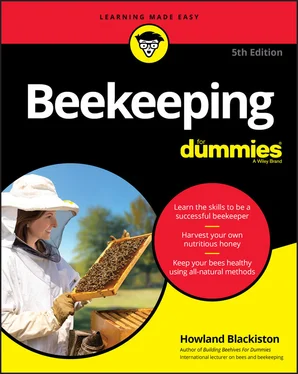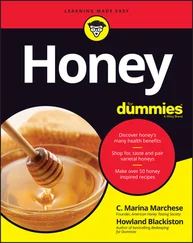1 ...6 7 8 10 11 12 ...20
KNOWING WHERE HONEY BEES COME FROM
Honey bees are native to Europe, Asia, and Africa, but they’re not native to other parts of the world (Australia, New Zealand, and the Americas). Colonies of German black honey bees were first brought to North America in the early 1600s by Virginia and Massachusetts colonists. The honey was used by the pioneers as their chief sweetener. These bees prospered and gradually colonized all of North America. But the black bee populations were seriously compromised by disease in the early 1800s and were ultimately replaced by Italian honey bees. Today, honey bees have become a vital part of our agricultural economy. Honey bees didn’t reach Australia and New Zealand until the early- to mid-1800s.
Beekeeping isn’t labor intensive. Sure, you’ll spend part of a weekend putting together your new equipment. And I anticipate that you’ll spend some time reading up on your new hobby. (I sure hope you read my book from cover to cover!) But the actual time that you absolutely must spend with your bees is surprisingly modest. Other than your first year (when I urge you to inspect the hive frequently to find out more about your bees), you need to make only five to eight visits to your hives every year. Add to that the time you spend harvesting honey, repairing equipment, and putting things away for the season, and you’ll probably devote 35 to 40 hours a year to your hobby. Of course it will take more time if you make a business out of it.
For a more detailed listing of seasonal activities, be sure to read Chapter 9.
Beekeeper personality traits
If you scream like a banshee every time you see an insect, I suspect that beekeeping will be an uphill challenge for you. But if you love animals, nature, and the outdoors, and if you’re curious about how creatures communicate and contribute to our environment, you’ll be captivated by honey bees. If you like the idea of “farming” on a small scale, or you’re intrigued by the prospect of harvesting your own all-natural honey, you’ll enjoy becoming a beekeeper. Sure, as far as hobbies go, it’s a little unusual, but all that’s part of its allure. Express your uniqueness and join the ranks of some of the most delightful and interesting people I’ve ever met: backyard beekeepers!
If you’re going to become a beekeeper, you can expect to get stung once in a while. It’s a fact of life. But when you adopt good habits as a beekeeper, you can minimize the chances that you’ll be stung.
All bee stings will hurt, but not for long. It’s natural to experience some swelling, itching, and redness. These are normal (not allergic) reactions. Some folks are mildly allergic to bee stings, and the swelling and discomfort may be more severe. The most severe and life-threatening reactions to bee stings occur in less than 1 percent of the population. So the chances that you’re dangerously allergic to honey bee venom are remote. If you’re uncertain, check with an allergist, who can determine whether you’re among the relatively few who should steer clear of beekeeping. Your allergist can test you in advance for a sting allergy.
You’ll find more information on bee stings in Chapter 3.
Deciding Which Beekeeping Approach to Follow
Historically, beekeeping books have provided information on when and how to medicate your bee colonies and which chemicals to use for controlling pests that can compromise the health and productivity of your colonies. If you go online and visit beekeeping supply vendors, they all offer medications and pest control products to help bees when things go wrong.
But in recent years, because of all the problems that bees have been facing, it has become prudent to take a fresh look at these historical approaches to caring for and medicating your bees. Are treatments being overused? Probably. Are less-experienced beekeepers simply misusing these products to the detriment of our bees? Likely. Should you routinely medicate bees as so many traditional beekeeping books of the past recommend? Doubtful. Or should you embrace a more natural approach with little or no use of medications or chemicals? I recommend it.
Clearly, there are many choices out there. This is a hot topic, and you will hear passionate arguments for and against the various possible options for various treatments. To decide which is right for you, it’s first helpful to define each of the new approaches that are being discussed in today’s world of beekeeping.
As a new beekeeper, you need to decide which approach or combination of approaches makes the most sense to you. I do my best to explain the options available to you and tell you about my own experiences. But it’s up to you in the end. Pick an approach and stick to it until you find a better one. And be aware that if you ask ten beekeepers which is best, you will likely get ten different answers.
Medicated beekeeping is a term intended to represent the “traditional” approach to honey-bee health that has been touted for decades in many of the books on beekeeping (including the first edition of this book). Indeed for generations, beekeepers were advised to follow an established yearly protocol of medications and chemical treatments as part of the yearly routine. As bees faced more and more health issues, more and more chemical options came to market intended to help bees thrive. Many of these meds were administered prophylactically by well-intended beekeepers, just in case the bees might get ill — not because they needed it. I have no doubt that over time, with the growth of new hobbyist beekeepers, the increase in bee health problems, a plethora of new medications, and the possible overuse or misuse of these meds, the traditional ways outlined in so many earlier books will need to be rethought.
If you check the Internet, you’ll find many opinions on what constitutes a natural approach to keeping bees. There is no universal definition. Natural beekeeping is more of an aspiration than an official set of rules. But still it’s helpful to have a shorthand description that captures the goal of natural beekeeping. So I went to the expert. I asked Ross Conrad, author of Natural Beekeeping, Organic Approaches to Modern Apiculture (Chelsea Green Publishing), to share his definition:
“When working on my book, my publisher and I settled on the title Natural Beekeeping . In retrospect, I realize that the term natural beekeeping is an oxymoron. A colony of bees that is manipulated by a person is no longer in its true, natural state. That said, the term natural beekeeping is used to refer to honey bee stewardship that addresses pest, disease, and potential starvation issues without relying on synthetic pesticides, antibiotic drugs, or the regular use of an artificial diet.”
Ross went on to tell me, “Natural beekeeping does not necessarily mean minimal manipulations and it definitely does not mean minimal hive inspections (as some have defined the term). If you are not regularly inspecting your colonies, you are unable to determine their needs, and you will be unable to take timely steps to keep your colonies viable. Minimal or no hive inspections is honey bee neglect, not natural bee stewardship.”
Organic beekeeping is related to, but not the same as, natural beekeeping. There are a lot of written criteria available on what constitutes organic beekeeping. This material is currently being developed in minutiae for publication by various branches of the U.S. government and will ultimately be published as United States Department of Agriculture (USDA) standards to govern the production of organic honey and honey-related products.
Читать дальше












